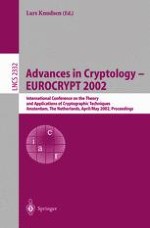2002 | OriginalPaper | Buchkapitel
Universally Composable Notions of Key Exchange and Secure Channels
Extended Abstract
verfasst von : Ran Canetti, Hugo Krawczyk
Erschienen in: Advances in Cryptology — EUROCRYPT 2002
Verlag: Springer Berlin Heidelberg
Enthalten in: Professional Book Archive
Aktivieren Sie unsere intelligente Suche, um passende Fachinhalte oder Patente zu finden.
Wählen Sie Textabschnitte aus um mit Künstlicher Intelligenz passenden Patente zu finden. powered by
Markieren Sie Textabschnitte, um KI-gestützt weitere passende Inhalte zu finden. powered by
Recently, Canetti and Krawczyk (Eurocrypt’2001) formulated a notion of security for key-exchange (ke) protocols, called SK-security, and showed that this notion suffices for constructing secure channels. However, their model and proofs do not suffice for proving more general composability properties of SK-secure ke protocols.We show that while the notion of SK-security is strictly weaker than a fully-idealized notion of key exchange security, it is sufficiently robust for providing secure composition with arbitrary protocols. In particular, SK-security guarantees the security of the key for any application that desires to set-up secret keys between pairs of parties. We also provide new definitions of secure-channels protocols with similarly strong composability properties, and show that SK-security suffices for obtaining these definitions.To obtain these results we use the recently proposed framework of “universally composable (UC) security.” We also use a new tool, called “non-information oracles,” which will probably find applications beyond the present case. These tools allow us to bridge between seemingly limited indistinguishability-based definitions such as SK-security and more powerful, simulation-based definitions, such as UC security, where general composition theorems can be proven. Furthermore, based on such composition theorems we reduce the analysis of a full-fledged multi-session key-exchange protocol to the (simpler) analysis of individual, stand-alone, key-exchange sessions.
